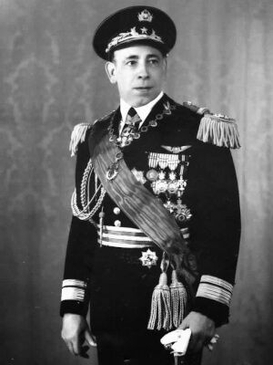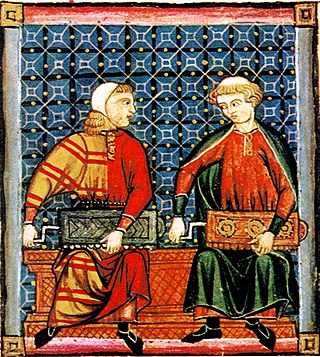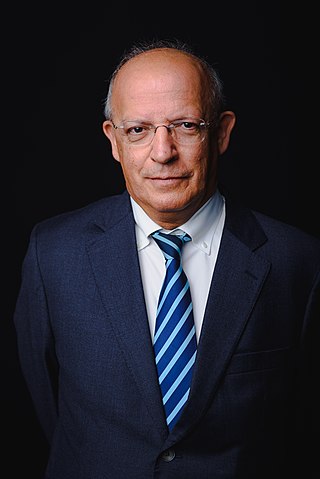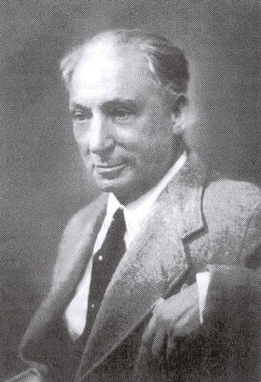
Sophia de Mello Breyner Andresen was a Portuguese poet and writer. Her remains have been entombed in the National Pantheon since 2014.

Eduardo Luís Barreto Ferro Rodrigues is a Portuguese politician and economist who had been President of the Assembly of the Republic since 2015 until 29 March 2022,in the 13th (2015–2019) and 14th Legislatures (2019–2022). He was Minister for Social Security,and later Minister for Public Works,in the governments of António Guterres.

Marcelo Nuno Duarte Rebelo de Sousa is a Portuguese politician and academic. He is the 20th and current president of Portugal,since 9 March 2016. He is a member of the Social Democratic Party,though he suspended his party membership for the duration of his presidency. Rebelo de Sousa has previously served as a government minister,parliamentarian in the Assembly of the Portuguese Republic,legal scholar,journalist,political analyst,law professor,and pundit.

Humberto da Silva Delgado was a General of the Portuguese Air Force,diplomat and politician.

Lídia Jorge is a prominent Portuguese novelist and author whose work is representative of a recent style of Portuguese writing,the so-called "Post Revolution Generation".
Maria Teresa de Mascarenhas Horta Barros is a Portuguese feminist poet,journalist and activist. She is one of the authors of the book Novas Cartas Portugesas,together with Maria Isabel Barreno and Maria Velho da Costa. The authors,known as the "Three Marias," were arrested,jailed and prosecuted under Portuguese censorship laws in 1972,during the last years of the Estado Novo dictatorship. The book and their trial inspired protests in Portugal and attracted international attention from European and American women's liberation groups in the years leading up to the Carnation Revolution.

Alfredo Rodrigues Gaspar was a Portuguese military officer and politician. Rodrigues Gaspar was President of the Ministry of one of the many governments of the Portuguese First Republic.

Adriano JoséAlves Moreira,ComC GCC GOIH GCSE was a Portuguese lawyer,professor and a leading political figure in Portugal throughout the second half of the 20th century.

In the Middle Ages,the Galician-Portuguese lyric,also known as trovadorismo in Portugal and trobadorismo in Galicia,was a lyric poetic school or movement. All told,there are around 1680 texts in the so-called secular lyric or lírica profana. At the time Galician-Portuguese was the language used in nearly all of Iberia for lyric poetry. From this language derives both modern Galician and Portuguese. The school,which was influenced to some extent by the Occitan troubadours,is first documented at the end of the twelfth century and lasted until the middle of the fourteenth,with its zenith coming in the middle of the thirteenth century,centered on the person of Alfonso X,The Wise King. It is the earliest known poetic movement in Galicia or Portugal and represents not only the beginnings of but one of the high points of poetic history in both countries and in Medieval Europe. Modern Galicia has seen a revival movement called neotrobadorismo.

JoséEduardo Franco is a Portuguese historian,journalist,poet and essayist. He has served as a lecturer at the University of the Azores,the University of Lisbon,the University of the Algarve,and the University of Coimbra. His writings focus on the history of Madeira,the Azores,and the Portuguese diaspora,as well as contemporary political and social issues.
Jaime Alexandre Nogueira Pinto is a Portuguese writer and university professor,son of Jaime da Cunha Guimarães by Alda Branca Nogueira Pinto,who died in 2007.
Jorge Ferreira Chaves was a Portuguese architect.

Maria Isabel Barreno de Faria MartinsGOIH was a Portuguese writer,essayist,journalist and sculptor. She was one of the authors of the book Novas Cartas Portugesas,together with Maria Teresa Horta and Maria Velho da Costa. The authors,known as the "Three Marias," were arrested,jailed and prosecuted under Portuguese censorship laws in 1972,during the last years of the Estado Novo dictatorship. The book and their trial inspired protests in Portugal and attracted international attention from European and American women's liberation groups in the years leading up to the Carnation Revolution.
Irene do Céu Vieira Lisboa was a Portuguese novelist,short story writer,poet,essayist and educational writer. Especially for her fictional work,she has achieved a special place in modern Portuguese literature.
Maria João Espírito Santo Bustorff SilvaGOM is a Portuguese restoration specialist,philanthropist and former politician. She is known for her historical and cultural restoration and preservation work in both Portugal and Brazil through the Ricardo Espírito Santo Foundation,and also for being Minister of Culture during the government of Prime Minister Pedro Santana Lopes.

Augusto Ernesto dos Santos Silva is a Portuguese sociologist,university professor,and politician who has been the President of the Assembly of the Republic since 2022,in the 15th Legislature. From November 2015 to March 2022,he was the Portuguese Minister of Foreign Affairs,in the XXI and XXII Constitutional Governments led by Prime Minister António Costa.

Reynaldo dos Santos was a Portuguese physician,writer,and art historian. As a physician,he was a pioneer in the fields of vascular surgery and urology;as an art historian,he published numerous works on 15th-century Portuguese art,including on the Manueline style and on the paintings of Nuno Gonçalves.

Elvira Maria Correia Fortunato is a Portuguese scientist and minister of science and technology. She is a professor in the Department of Materials Science at the NOVA School of Science and Technology and vice-rector of the NOVA University Lisbon. Fortunato is an innovator in the field of paper electronics,including transistors,memories,sensors,batteries,displays,antennas,and solar cells.

Maternidade Alfredo da Costa is a public Central Hospital serving the Greater Lisbon area as part of the Central Lisbon University Hospital Centre (CHULC),a state-owned enterprise.
Maria Isabel Guerra Bastos Gonçalves,who used the pseudonym Isabel da Nóbrega,was a Portuguese writer,playwright,columnist,translator and radio broadcaster. On 9 June 2000,she was made a Grand-Officer of the Order of Merit. On 25 April 2011,she was made a Grand-Officer of the Order of Liberty.














